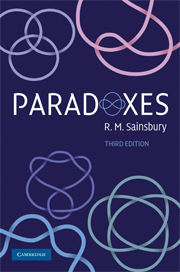Book contents
- Frontmatter
- Contents
- Foreword to third edition
- Introduction
- 1 Zeno's paradoxes: space, time, and motion
- 2 Moral paradoxes
- 3 Vagueness: the paradox of the heap
- 4 Acting rationally
- 5 Believing rationally
- 6 Classes and truth
- 7 Are any contradictions acceptable?
- Appendix I Some more paradoxes
- Appendix II Remarks on some text questions and appended paradoxes
- Bibliography
- Index
7 - Are any contradictions acceptable?
Published online by Cambridge University Press: 05 June 2012
- Frontmatter
- Contents
- Foreword to third edition
- Introduction
- 1 Zeno's paradoxes: space, time, and motion
- 2 Moral paradoxes
- 3 Vagueness: the paradox of the heap
- 4 Acting rationally
- 5 Believing rationally
- 6 Classes and truth
- 7 Are any contradictions acceptable?
- Appendix I Some more paradoxes
- Appendix II Remarks on some text questions and appended paradoxes
- Bibliography
- Index
Summary
In previous chapters, I have at many points argued that if something leads to a contradiction, then either it, or the relevant reasoning, must be rejected. The assumption that one must always reject contradictions has come under attack at various times in the history of philosophy. Recently, the attack has taken a subtle form and has harnessed impressive technical resources.
I shall discuss the following views:
(1) Some contradictions are true.
(2) For some contradictions, it is rational to believe that they are true.
The only version of (1) that I shall consider also holds that every contradiction is false; this is “dialetheism.” However, the view that some contradictions are both true and false does not add up to the view that some contradictions are acceptable, for one might go on to insist that anything perceived to be false should be rejected. If so, the assumption of the previous chapters of this book would remain unchallenged: we should reject anything which leads to a contradiction. So in this chapter I will discuss the conjunction of views (1) and (2). I shall call this combination “rational dialetheism.”
The rational dialetheist's claim that some contradictions are true is, under natural assumptions, equivalent to the claim that some sentences are both true and false. Any such sentence may be called a dialetheia.
- Type
- Chapter
- Information
- Paradoxes , pp. 150 - 159Publisher: Cambridge University PressPrint publication year: 2009



